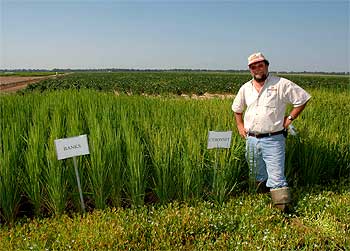Stuttgart, Arkansas
August 11, 2006
When selecting seed to plant,
farmers should consider what can go wrong during the growing
season and think in terms of managing risk,
Rick Cartwright told
visitors to the Rice
Research and Extension Center here Wednesday, Aug. 9.
Cartwright, a plant pathologist, and other
University of Arkansas
Division of Agriculture scientists discussed research programs
that impact the production, processing and marketing of rice and
soybeans.
"The most fundamental factor in agriculture is good genetics,"
Cartwright said. "Genetics determine the risk potential of a
seed variety as well as yield and quality potential."
In fields where red rice has become a stubborn weed problem,
herbicide resistant Clearfield varieties are a good choice,
Cartwright said. If the sheath blight fungus has found a home in
a field, Rice Tec hybrids are among those rated as more
genetically resistant to damage.
|
 |
|
Rice breeder James Gibbons discussed strengths
and weaknesses of Cybonnet and other rice
varieties at a field day Wednesday, Aug. 9., at
the Rice Research and Extension Center. He said
Cybonnet is a well rounded variety with the best
milling yield of all Arkansas adapted varieties. |
|
Rice breeder
Dr. James Gibbons and
Cartwright said Cybonnet should be planted more than it has been
since seed became available in 2005, because it has good risk
management potential as well as high yield and quality
potential.
Cybonnet was developed in the U of A Division of Agriculture
breeding program based at Stuttgart. Among Arkansas adapted
varieties, Cybonnet has the best genetic potential in two key
areas of milling yield and blast disease resistance, and it
produces consistently high yields in all Arkansas rice
environments, Gibbons and Cartwright said.
Wells, another high yielding Arkansas variety and the most
widely planted in the state, is also a good choice for risk
management, but it has weaknesses that increase risk for some
growers. Wells is superior to Cybonnet for sheath blight
tolerance, but Cybonnet is more resistant to the rice blast
fungus.
Production practices are also part of the risk management
mindset, Cartwright said.
Farmers who have skimped on potash (potassium) in their
fertilizer to save money have exposed themselves to the risk of
stem rot, which weakens stems and can cause lodging, Cartwright
said. Potash is recommended for silt loam and sandy loam soils
with low soil test levels for potassium for several reasons,
including resistance to stem rot.
Annual variety performance tests by the Division of Agriculture
provide an objective measure of yield, quality and risk
management potential under Arkansas conditions. Variety trial
results for rice, cotton, soybeans, small grains, corn and grain
sorghum are available online at ArkansasVarietyTesting.org or
from county offices of the Cooperative Extension Service. |